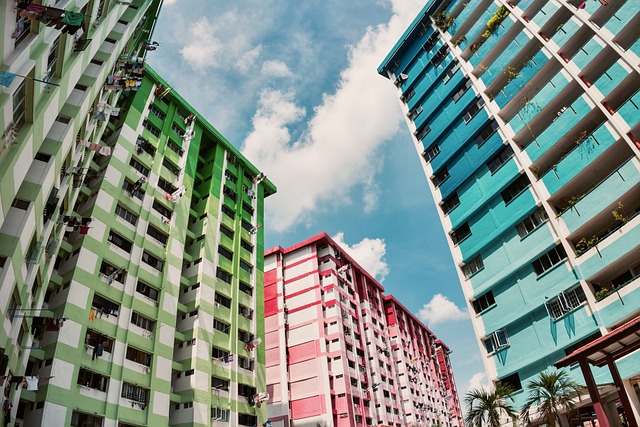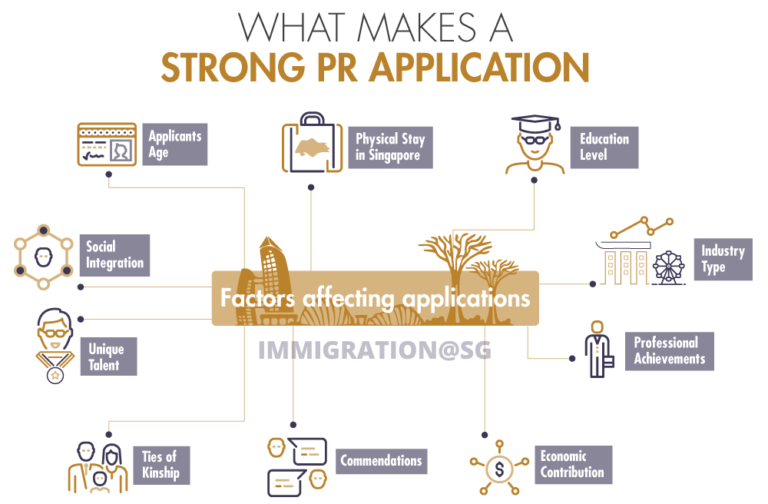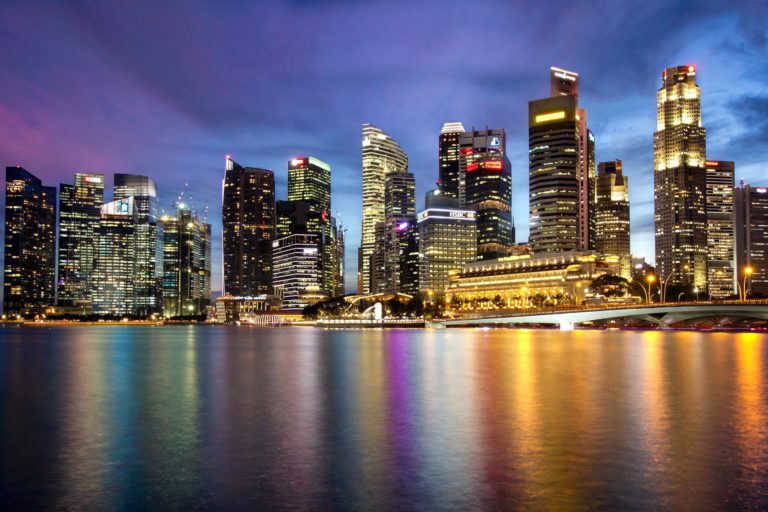Singapore is a global hub known for its economic stability, high standard of living, and strict immigration policies. Many long-term foreign residents who have lived in Singapore since childhood find themselves facing a perplexing challenge of getting their Permanent Residency (PR) applications approved. Despite growing up in the country, integrating into society, and contributing to the economy, they often fail to secure PR status. So why is this happening?
1. Immigration Policies & Quotas
PR Approval Quotas
Only around 30,000 PR applications are approved every year. The government prioritises a balanced and sustainable population, ensuring that PRs contribute meaningfully to the economy and society.
After COVID-19, the number of PR approvals has slightly increased to an approximate 33,000 in 2021 and 34,000 in 2022 and 2023. This could be a result of the pandemic that caused a sharp drop in the number of PR approved in 2020 at 27,470 – the lowest since 2010. With the 6.9 million population target looming and the added strain of historically low birth rates, the number of PR approvals might continue to increase slightly in the next few years.
Racial Quotas
The Singapore government does not want to disrupt the racial harmony that they have been nurturing since the early days of independence. The racial composition that makes up the local population in Singapore has a lot to do with maintaining this harmony and security. Therefore, new residents and citizens need to be able to assimilate into the local racial composition and cultures. Applicants who belong to one of the ethnic groups of the local population – Chinese, Malay, Indian will be subjected to the 75%, 15%, 9% quotas respectively. Everyone else will be categorised in Others, which only has a 1% quota.
Even if someone has lived in Singapore for years, their PR application is still subject to these PR and racial quotas, making approvals highly competitive, especially when it comes to the racial quota. This is because the competition from certain races or nationalities can be very high, for example, Indians. Due to Singapore’s geographical proximity with India, many Indians prefer to look for opportunities here to be close to family who are still living in India. Other races such as Caucasians from the United Kingdom, United States of America, and Europe will all be collectively categorised in Others and because of the low quota, approval rate is highly competitive as well.
Knowing of these quotas should make long-term residents aware of the difficulty in getting a Singapore PR. However, long-term foreign residents may focus on the other aspects of the Singapore PR application to make their profile stand out amongst the competition. The government looks at every submission holistically so long-term foreign residents should take advantage of this fact and improve their chances.
2. Economic Contribution Matters More Than The Length of Stay
Economy’s Role in Singapore’s Immigration Policy
Singapore, known for its pragmatic approach to governance, seeks residents who can contribute to its economy and sustain themselves financially. Unlike resource-rich nations, Singapore lacks natural resources and relies heavily on its human capital to drive economic growth.
Given this economic reality, PR applications are evaluated based on several key factors, including employment status, income level, economic contribution, and long-term potential. Having lived in Singapore for decades or even since birth does not guarantee PR approval. If an applicant lacks a stable source of income or the ability to contribute meaningfully to the economy, they may still face rejection.
With Singapore’s approach to continuous learning and upskilling, long-term foreign residents have access to a wide range of professional training programs and courses that can help them upgrade their skills or transition into new careers, ultimately enhancing their employability. For example, institutions such as the Singapore Management University (SMU), National University of Singapore (NUS), and Nanyang Technological University (NTU) offer executive education programs in areas like business management, finance, and data analytics. Additionally,professional certification programs, such as Project Management Professional (PMP), Chartered Financial Analyst (CFA), or Certified Scrum Master (CSM), are also widely available through private training providers like Singapore Institute of Management (SIM), Kaplan, and Lithan Academy. These options allow foreign professionals to stay competitive in Singapore’s dynamic job market by acquiring new expertise and credentials.
Industry Preferences and Misconceptions About PR Approval
The Singaporean government prioritises PR applicants who work in sectors experiencing a shortage of skilled professionals, such as finance, technology, engineering, and healthcare. These industries are crucial to Singapore’s long-term economic strategy and innovation landscape. However, a common misconception is that earning a high income automatically increases one’s chances of PR approval. While income is considered, it is not the sole determining factor – other aspects such as job stability, industry relevance, and the applicant’s ability to integrate into Singaporean society also play significant roles.
Opportunities for Workers in F&B and Retail Sectors
Beyond high-skilled professions, Singapore also faces labor shortages in Food & Beverage (F&B) and retail industries. These sectors often struggle to attract local workers due to long working hours and comparatively lower wages. Foreigners who may not possess advanced educational qualifications but are willing to take up essential roles in these industries can still be considered for PR, as their contributions help sustain vital sectors of the economy.
Financial Portfolio & Property
Having comprehensive insurance plans, investment portfolios, and buying a residential property for one’s own stay are some ways to show how much a foreigner plans to live long-term in Singapore, therefore, would help increase the chances of PR approval.
3. Family Ties & Sinking Roots in Singapore
When assessing a PR application, the Immigration and Checkpoints Authority (ICA) of Singapore takes into account the applicant’s family background and ties to Singapore. This means that an applicant’s chances of approval can be influenced by their family members’ residential status, history, and contributions in Singapore.
Having Family Members Who Are Singapore Citizens (SCs) or PRs
If an applicant has immediate family members—such as parents, spouses, or children—who are Singapore Citizens (SCs) or Permanent Residents (PRs), their application is generally viewed more favourably. This is because it indicates a stronger integration into Singaporean society, which aligns with ICA’s goal of fostering stable and rooted communities.
Spousal Relationship
A foreign spouse of a Singapore Citizen or PR has a better chance of securing PR status, especially if they have been married for a substantial period and have children. However, ICA assesses the genuineness and stability of the marriage to prevent sham marriages intended for immigration benefits. Long-term foreign residents who grew up in Singapore and got married to a local would not have any issues proving their marriage legitimacy.
4. Integration and Cultural Fit
The government prioritises applicants who are well-integrated into Singaporean society. This includes factors such as:
- Proficiency in English or a local language (Mandarin, Malay, or Tamil)
- Participation in community activities
- Social ties with Singaporeans
- Contribution to the local community by regular donations or volunteering
A long-term resident who has remained socially isolated or has not contributed to local community initiatives may be viewed as less committed to integrating into Singaporean society. However, having local friends and colleagues, going to local schools, and building a family in Singapore would greatly help show willingness to live like a Singaporean.
Importance of Racial Harmony
Singapore is a multicultural and multi-ethnic society, home to people of diverse racial and religious backgrounds, including Chinese, Malays, Indians, Eurasians, and many other minorities. Despite its diversity, Singapore has remained peaceful and united due to its strong emphasis on racial harmony, which is a core pillar of the nation’s identity and stability.
Foundation of National Unity
Racial harmony fosters a sense of belonging and unity among Singaporeans, ensuring that people of different races live, work, and interact peacefully. This unity is crucial for maintaining social stability and preventing racial tensions that could divide the nation.
Learning from Historical Lessons
Singapore’s commitment to racial harmony is rooted in past experiences, such as the racial riots of the 1950s and 1960s, which highlighted the dangers of racial conflict. These incidents reinforced the need for strong policies and social initiatives to promote mutual understanding and respect.
Celebrating Diversity Through Racial Harmony Day
Singapore observes Racial Harmony Day on July 21 every year, reminding citizens of the importance of racial unity. Schools, workplaces, and community groups organise activities to promote inter-racial interactions and cultural appreciation.
Therefore, new and foreign residents need to understand this concept, take initiative to integrate into the local community, and emulate the local culture of tolerance and understanding.
5. Repeated PR Rejections May Indicate a Weak Profile
Some long-term foreign residents experience multiple PR rejections despite living in Singapore for years, maybe even since birth. This may be a sign that their profile does not meet the ICA’s criteria. Instead of reapplying without changes, applicants should reassess their profile, improve their economic contribution, strengthen their social integration, and demonstrate stronger ties to Singapore. Reapply again once they have a better standing in various aspects of their life.
Hope For Long-Term Foreign Residents in Getting Singapore PR
Securing PR in Singapore is a process that aligns with national priorities and long-term development goals. While residency duration alone does not guarantee approval, applicants who actively contribute to Singapore’s economy, culture, and society stand a strong chance of success. By understanding the key factors and taking positive steps, hopeful applicants can position themselves for a bright future in Singapore.
For help on PR application, Whatsapp to 8766 1966 or email to info@iasg.com.sg.







